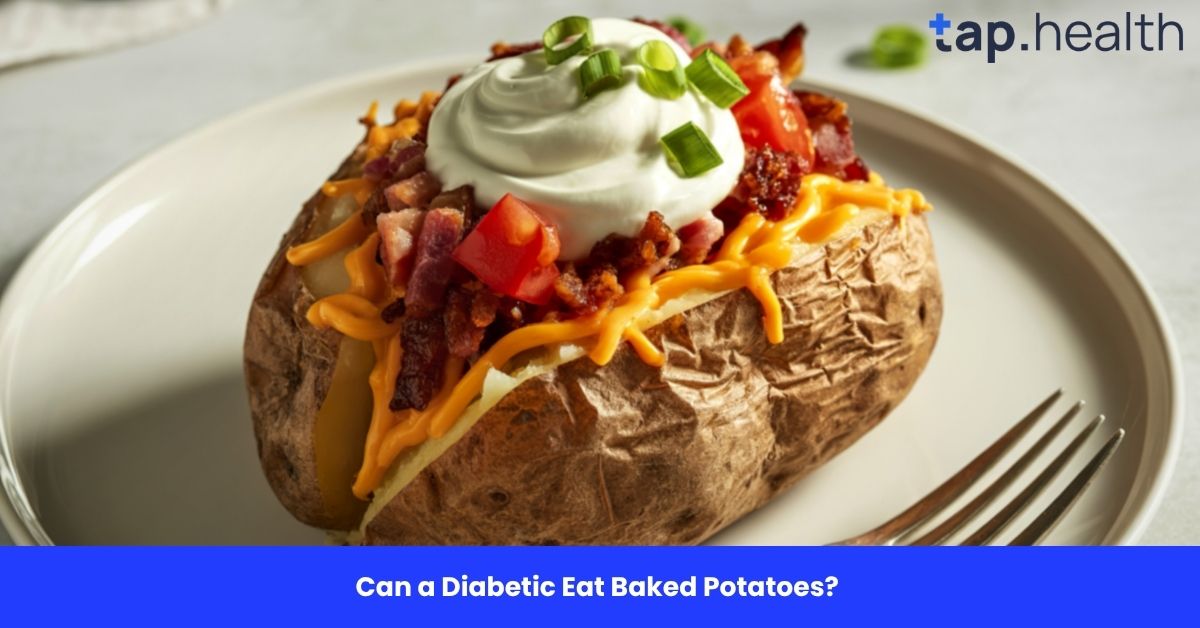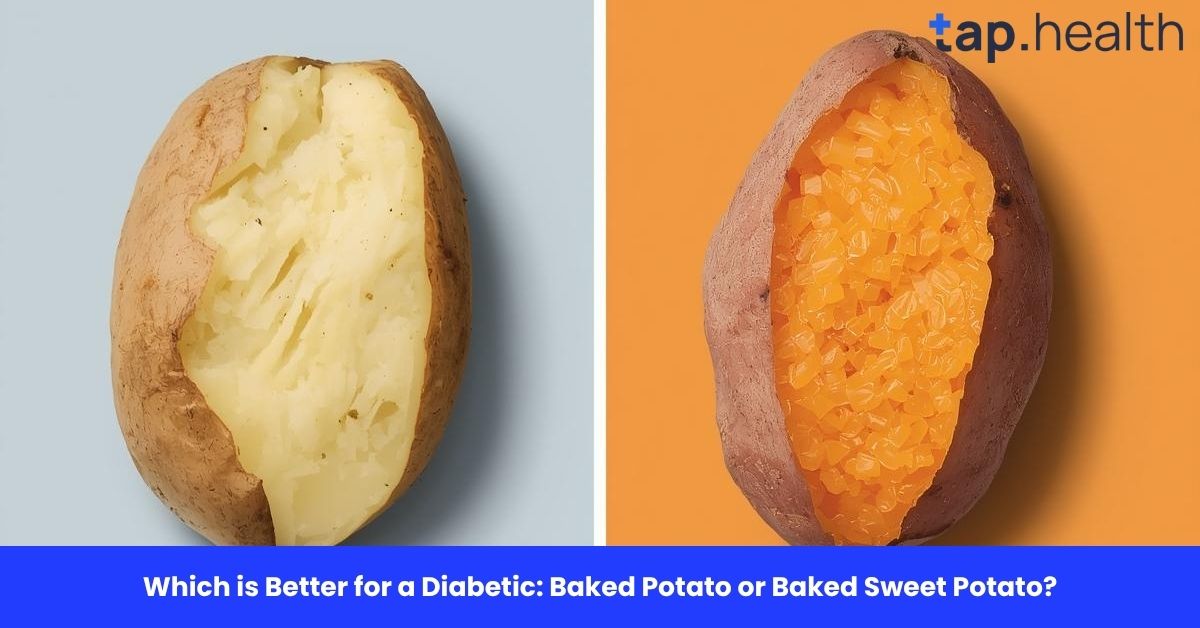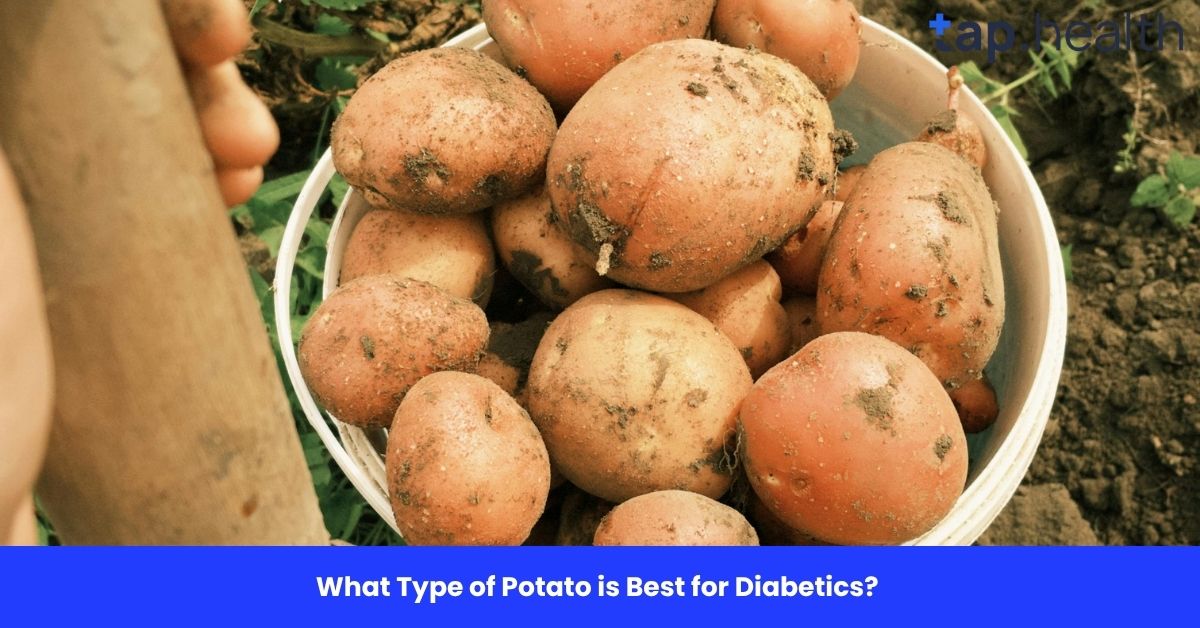For those with diabetes, managing blood sugar levels is a key part of staying healthy. The foods you eat play a crucial role in this process, so it’s important to know which foods are safe and beneficial and which ones can cause spikes in blood sugar. One common food that often comes up is the potato, particularly baked potatoes. If you have diabetes, you may wonder, Can a diabetic eat baked potatoes?
In this blog, we’ll explore how baked potatoes affect blood sugar, whether they can fit into a diabetic-friendly diet, and how to enjoy them in a way that helps manage diabetes. We’ll also discuss the nutritional content of baked potatoes, their glycemic index, and provide tips on how to eat them safely.
By the end of this post, you’ll have a thorough understanding of whether baked potatoes can be part of a healthy, balanced diet for someone with diabetes.
What is Diabetes and Why Does It Matter?
Before we dive into the topic of baked potatoes, it’s important to understand what diabetes is and why managing blood sugar levels is so essential.
What is Diabetes?
Diabetes is a condition where the body either doesn’t produce enough insulin or doesn’t use insulin properly. Insulin is a hormone that helps regulate blood sugar by allowing it to enter the cells, where it can be used for energy. When there is too much sugar in the blood, it can cause serious health problems over time.
There are two main types of diabetes:
- Type 1 Diabetes: An autoimmune condition where the body does not produce insulin.
- Type 2 Diabetes: A condition where the body becomes resistant to insulin, or the pancreas does not produce enough insulin.
For both types, it’s important to manage blood sugar levels through a combination of diet, exercise, and sometimes medication. Carbohydrates, such as those found in baked potatoes, can have a significant impact on blood sugar levels.
Why Does Managing Blood Sugar Matter?
Uncontrolled blood sugar can lead to a range of complications, including:
- Heart disease
- Kidney problems
- Nerve damage
- Eye problems
- Poor wound healing
Maintaining stable blood sugar levels is key to managing diabetes and preventing these long-term issues.
What Are Baked Potatoes Made Of?
Baked potatoes are made from potatoes, a starchy vegetable. Potatoes are rich in carbohydrates, which can affect blood sugar levels. When baked, the starch in potatoes turns into simple sugars during digestion, causing a rise in blood sugar. But how much it rises depends on the type of potato and how it’s prepared.
Nutritional Content of a Baked Potato
A typical medium-sized baked potato (about 150 grams) contains:
- Calories: 130-150 calories
- Carbohydrates: 30 grams
- Fiber: 2-3 grams
- Protein: 3 grams
- Fat: 0 grams
- Vitamins and minerals: Potassium, Vitamin C, Vitamin B6, Iron, and Magnesium
As you can see, baked potatoes are high in carbohydrates. For someone with diabetes, controlling carbohydrate intake is essential, as too many carbs can cause blood sugar spikes.
How Do Baked Potatoes Affect Blood Sugar?
To determine if a baked potato can fit into a diabetic diet, we need to consider how it affects blood sugar levels. The glycemic index (GI) is a tool used to measure how quickly a food raises blood sugar. Foods with a high GI cause a rapid rise in blood sugar, while foods with a low GI cause a slower, more gradual increase.
Glycemic Index of Baked Potatoes
Baked potatoes generally have a high glycemic index, meaning they can cause a quick increase in blood sugar. The GI of a baked potato can vary depending on the type of potato, the size, and how it is cooked, but it typically ranges between 85 and 111. Foods with a GI above 70 are considered high GI, and they can cause blood sugar levels to rise rapidly.
This rapid rise in blood sugar can be problematic for people with diabetes because it can lead to fluctuations in blood sugar levels, which are harder to manage.
How Does the Glycemic Index Affect Blood Sugar?
When you consume high-GI foods like baked potatoes, your body breaks them down quickly, releasing glucose into the bloodstream. This can cause a sharp spike in blood sugar, which may be challenging for diabetics to manage.
However, the way you prepare and eat baked potatoes can influence their impact on blood sugar. Pairing them with other foods that are low in GI (such as vegetables, lean protein, or healthy fats) can help slow down the sugar absorption process and reduce blood sugar spikes.
Can Diabetics Eat Baked Potatoes?
Yes, diabetics can eat baked potatoes, but there are a few important things to consider to ensure they don’t cause a spike in blood sugar levels.
1. Portion Size Matters
One of the most important factors in controlling blood sugar when eating baked potatoes is portion size. A medium-sized baked potato can contain up to 30 grams of carbohydrates, which is quite a lot for someone managing their blood sugar. Eating large portions of baked potatoes can cause a significant rise in blood sugar.
To make baked potatoes more diabetes-friendly, consider:
- Eating smaller portions of baked potatoes.
- Pairing the potato with a source of protein (e.g., grilled chicken or beans) and healthy fats (e.g., olive oil or avocado) to balance the meal and reduce the blood sugar impact.
2. Choose Potatoes with Lower GI
Some types of potatoes have a lower glycemic index than others. For example, sweet potatoes generally have a lower GI than white potatoes, making them a better choice for people with diabetes. New potatoes or baby potatoes also tend to have a lower GI compared to russet or Idaho potatoes, which are commonly used for baking.
If you prefer to eat baked potatoes, try using waxy potatoes like red potatoes or fingerling potatoes, as they tend to have a lower GI compared to starchy potatoes.
3. Eat the Skin
The skin of the potato contains fiber, which can help slow down the absorption of sugar and reduce the spike in blood sugar. Whenever possible, opt for baked potatoes with the skin on, as this increases the fiber content and makes the meal more diabetes-friendly.
4. Pair with Healthy Foods
As mentioned earlier, pairing baked potatoes with healthy foods like vegetables, lean proteins, or healthy fats can help control blood sugar levels. For example:
- Add olive oil and roasted vegetables to your baked potato for a balanced meal.
- Top your potato with Greek yogurt or low-fat cheese for protein and fat that won’t spike blood sugar.
5. Consider the Cooking Method
The way you cook potatoes can influence their glycemic index. For instance, boiled potatoes generally have a lower glycemic index compared to baked potatoes. However, the impact on blood sugar also depends on how long the potato is cooked and its overall texture. Cooling cooked potatoes after baking them can also lower their glycemic index due to the formation of resistant starch.
6. Avoid Adding High-Sugar Toppings
Toppings like sour cream, butter, or cheese may not necessarily spike blood sugar directly, but they can add extra calories and fat, which may contribute to weight gain and other health issues. Instead, opt for healthier toppings like olive oil, salsa, or low-fat Greek yogurt.
Read this : How Many Calories Are in a Baked Potato?
Healthier Alternatives to Baked Potatoes for Diabetics
If baked potatoes seem too high in carbohydrates or if you’re looking for alternatives, here are some healthier options to consider:
1. Sweet Potatoes
Sweet potatoes have a lower glycemic index compared to regular potatoes and are a good source of fiber, vitamins, and minerals. They also contain more antioxidants, which are beneficial for overall health. Sweet potatoes are a great substitute for baked potatoes and can be enjoyed in many of the same ways.
2. Cauliflower
For a lower-carb alternative, cauliflower can be a great option. It can be roasted, mashed, or even used to make cauliflower rice. It is low in carbs and has a very mild taste, making it a great substitute for potatoes in many dishes.
3. Zucchini or Butternut Squash
Zucchini and butternut squash are both low-carb, nutritious alternatives to potatoes. They can be roasted, baked, or even used to make “fries” in place of regular potatoes.
Frequently Asked Questions (FAQs) on Can a Diabetic Eat Baked Potatoes?
1. Can a diabetic eat baked potatoes?
Yes, a diabetic can eat baked potatoes in moderation. It’s important to manage portion size, choose lower-GI potato varieties, and pair them with protein and healthy fats to reduce their impact on blood sugar.
2. Are sweet potatoes better than regular potatoes for diabetics?
Yes, sweet potatoes have a lower glycemic index compared to regular white potatoes, making them a better option for managing blood sugar levels. They are also high in fiber and antioxidants, which are beneficial for overall health.
3. How can I reduce the blood sugar spike from baked potatoes?
To reduce the blood sugar spike from baked potatoes, try eating smaller portions, choosing lower-GI potato varieties, eating the skin for added fiber, and pairing them with protein and healthy fats.
4. Can I eat baked potatoes if I am on a low-carb diet?
Baked potatoes are high in carbs, so they may not fit well into a strict low-carb diet. If you’re following a low-carb diet, you may want to limit your intake of baked potatoes and choose alternatives like cauliflower or zucchini.
5. Are there any healthier alternatives to baked potatoes?
Yes, alternatives like sweet potatoes, cauliflower, and zucchini are healthier options for diabetics. These alternatives are lower in carbs and have a lower glycemic index.
Conclusion
Baked potatoes can be part of a healthy diet for people with diabetes, but they need to be eaten in moderation and paired with other foods that help manage blood sugar levels. The high glycemic index of baked potatoes can cause a rapid rise in blood sugar, so portion size, potato variety, and preparation method are key factors to consider.
By making smart choices, such as eating smaller portions, choosing lower-GI potatoes, and adding healthy toppings, diabetics can enjoy baked potatoes without causing spikes in blood sugar. If you’re looking for lower-carb alternatives, sweet potatoes, cauliflower, and zucchini are excellent options.
Always remember to work with your healthcare provider or dietitian to find the best dietary plan for managing your diabetes.


